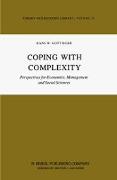Coping with Complexity
BücherAngebote / Angebote:
In this book I develop a theory of complexity for economics and manage ment sciences. This book is addressed to the mathematically or analytically oriented economist, psychologist or management scientist. It could also be of interest to engineers, computer scientists, biologists, physicists and ecologists who have a constant desire to go beyond the bounds of their respective disciplines. The unifying theme is: we live in a complex world, but how can we cope with complexity? If the book has made the reader curious, and if he looks at modelling, problem recognition and problem solving within his field of competence in a more "complex" way, it will have achieved its goal. The starting point is the recognition that complexity is a well-defined concept in mathematics (e.g. in topological dynamics), computer science, information theory and artificial intelligence. But it is a rather diffuse concept in other fields, sometimes it has only descriptive value or even worse, it is only used in a colloquial sense. The systematic investigation of complexity phenomena has reached a mature status within computer science. Indices of computer size, capacity and performance root ultimately in John von Neumann's paradigmatic model of a machine, though other 1 roots point to McCulloch and Pitts, not to forget Alan Turing. Offsprings of this development include: -complexity of formal systems and recursiveness, -cellular automata and the theory of self-reproducing machines, -theory of program or computational complexity, -theory of sequential machines, -problem solving, cognitive science, pattern recognition and decision processes.
Folgt in ca. 15 Arbeitstagen
